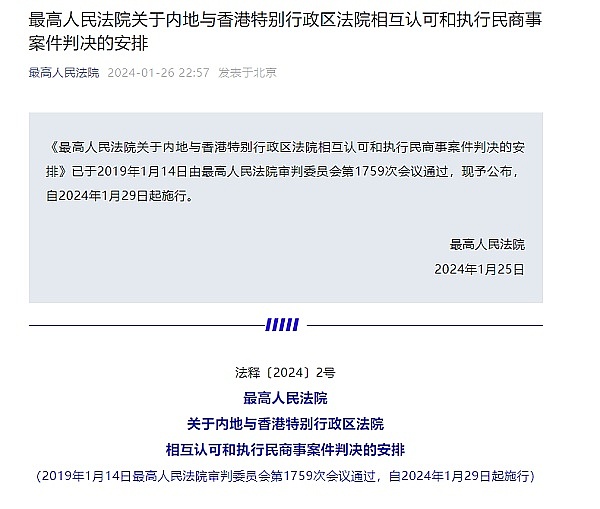
Source: Mankun Blockchain Law
The Supreme Court promulgated the “Arrangement on Mutual Recognition and Implementation of Judgments in Civil and Commercial Cases between the Mainland and the Hong Kong Special Administrative Region Courts” to be implemented on January 29, 2024.At this point,All arrangements for mutual judicial assistance that have been passed by the Mainland and Hong Kong have taken effect.

01History of mutual judicial assistance between the two places
The civil and commercial rulings in mainland Hong Kong have a long history of judicial assistance.
The enforcement of court judgments and arbitral awards across jurisdictions usually depends on international judicial assistance treaties to achieve them.In Hong Kong and the Mainland, it was achieved through various arrangements negotiated and signed between the two places.Article 95 of the Basic Law of the Hong Kong Special Administrative Region of the People’s Republic of China stipulates that the Hong Kong Special Administrative Region may contact and provide mutual assistance to judicial organs in other regions of the country through consultation and consultation.
At present, the agreements signed on mutual judicial assistance between the two places are as follows:
-
The “Arrangement on the Mutual Entrusted Service of Civil and Commercial Judicial Documents between the Mainland and the Hong Kong Special Administrative Region Courts, which came into effect on March 30, 1998
-
The “Arrangement on the Mutual Implementation of Arbitral Awards between the Mainland and the Hong Kong Special Administrative Region” adopted on 18 June 1999, effective on 1 February 2000
-
The “Arrangement on the Judgment of Civil and Commercial Cases under the jurisdiction of the Mutual Recognition and Enforcement Agreement between the Courts of the Mainland and the Hong Kong Special Administrative Region” was adopted on June 12, 2006.
-
The “Arrangement on the mutual commission of the courts of the Mainland and the Hong Kong Special Administrative Region for the mutual commission of civil and commercial cases” adopted on October 31, 2016, effective on March 1, 2017
-
The “Arrangement on Mutual Recognition and Enforcement of Judgments in Civil Cases of Marriage and Family” passed on May 22, 2017, effective on February 15, 2022
-
AtAdopted on January 14, 2019 and effective on January 29, 2024“Arrangement on Mutual Recognition and Enforcement of Judgments in Civil and Commercial Cases between the Mainland and the Hong Kong Special Administrative Region Courts”
-
The “Arrangement on the mutual assistance and preservation of the courts of the Mainland and the Hong Kong Special Administrative Region in the Arbitration Procedures, which came into effect on October 1, 2019》
-
The “Supplementary Arrangement on the Mutual Implementation of Arbitral Awards between the Mainland and the Hong Kong Special Administrative Region” adopted on November 9, 2020 and effective on November 27, 2020
From the history of the above arrangement, it can be seen thatFrom the initial delivery of documents and evidence extraction to mutual recognition and enforcement, from procedures to entities, from arbitration to judgments, the degree of judicial assistance is becoming deeper and wider, which helps strengthen the two places.Cooperate to improve the effectiveness of the judicial system and protect the legal rights and interests of relevant parties.In particular, the problem of “difficulty in cross-border execution” can be greatly solved.
02Impact on the Web3.0 industry
The Hong Kong Government’s Rules for Civil and Commercial Judgments (Mutual Enforcement) and the “Notice of the Mainland Civil and Commercial Judgments (Mutual Enforcement) Ordinance (Effective Date)” and the “Regulations for Civil and Commercial Judgments (Mutual Enforcement) Ordinance” (Chapter 645) and the “Rules for Civil and Commercial Judgments in Mainland China (Mutual Enforcement)” were implemented on January 29, 2024.The Supreme Court’s “Arrangement on Mutual Recognition and Implementation of Judgments in Civil and Commercial Cases between the Mainland and the Hong Kong Special Administrative Region Courts” was also implemented on January 29, 2024.The two places have completely achieved synchronization in the implementation of judicial assistance matters.
Currently in the mainland, due to regulatory reasons, disputes involving virtual currencies, whether court judgments or arbitration awards, are full of uncertainty, and the possibility of being considered invalid by judicial authorities on the grounds of violating public order and good customs is extremely high.However, Hong Kong is committed to building a world Web3.0 center. Its attitude towards the Web3.0 industry is very different from that in the mainland. Naturally, it can be foreseeableIn legal disputes involving virtual currencies, Hong Kong judicial organs will be more open and inclusive.
Although there is an international commodity principle under common law. For example, although the contract stipulates that the Hong Kong Law is applicable, the contract violates mainland laws when it is performed in mainland China, and the Hong Kong court may refuse to enforce the contract agreement based on this principle.
However, the application of the principle of international courtesy is very cautious. The judge will consider various factors in a comprehensive way and will never simply invoke it..
Lawyer Mankun Jinjianzhi understood that the Hong Kong judicial authorities cited the principle of international courtesy to deny the validity of mainland citizens and enterprises’ legal acts involving virtual currencies are not high.There are two main reasons:
1. The regulatory policies in the mainland are not legal in terms of effectiveness, but only policy documents, and policy documents are highly timely and volatile;
2. Hong Kong has its own ideas about the Web3.0 industry.
Therefore, since the judicial attitude of Hong Kong judiciary to virtual currencies is expected,As it is more convenient for the mutual execution of civil and commercial judgments and arbitration awards in the two places, it is possible to seek the jurisdiction of currency-related disputes in Hong Kong by obtaining the winning judgment and ruling in Hong Kong according to the relevant judicial assistance arrangements.Enforcement, which can not only avoid the current unfriendly policy provisions of mainland courts for virtual currencies, but also enable commercial arrangements to have judicial relief channels..
03Summarize
Since the Hong Kong government made efforts on Web3.0, the biggest concerns for mainland Web3.0 entrepreneurs have begun to be gradually cleared by the Hong Kong government.Many things in Web3.0 can be arranged in various ways. Like other industries, they can not only innovate business models, but also have no need to worry about the lack of legal protection, and their future is gradually brighter.








